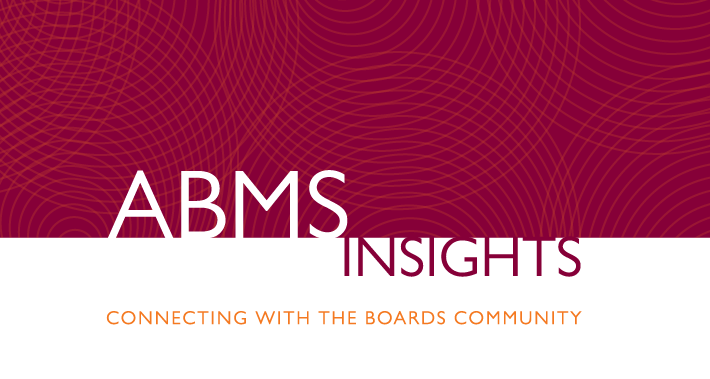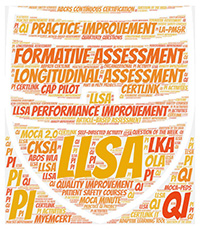
The American Board of Medical Specialties (ABMS) Member Boards are using formative, longitudinal assessments to accelerate the translation of medical knowledge into practice. These innovative approaches allow the boards to evaluate physician knowledge, identify knowledge gaps, and support learning and improvement through rapid feedback. The following examples illustrate how these assessments are designed to help increase knowledge of relevant new evidence and improve patient care and health care systems.
Longitudinal assessment involves:
- Shorter assessments of specific content related to a physician’s needs and interests
- Recurring assessments over a specified timeframe to reinforce concepts and promote learning and retention
- Ongoing performance feedback to identify areas in which additional learning is desirable
- Follow-up assessments to ensure that knowledge gaps are addressed

Because of their real-time administration, Member Boards are using these assessments to increase adoption of emerging medical knowledge and urgent public health content that clinicians are likely to confront in practice, in addition to covering core knowledge associated with their respective specialties.
Key advances in the American Board of Emergency Medicine’s (ABEM) MyEMCert modules include clinical policy alerts, practice advances, and suggestions from the literature. A diverse panel of practicing Emergency Medicine (EM) physicians review suggested topics using National Academy of Medicine criteria and evidence-based medicine guidelines to help choose appropriate topics. To span the gap between access to journals and proprietary sources of EM advances, ABEM creates synopses of each selected key advance topic with open access. Current clinical policy alert topics address seizures, acute headache, and opioid use from the American College of Emergency Physicians; guideline updates from the American Hospital Association; and community-acquired pneumonia in adults. Examples of current practice advance topics are the History, ECG, Age, Risk factors, and Troponin – or HEART – score and stroke. Some of the high-impact practice recommendations are highlighted in short Osmosis videos. As key advances are incorporated into clinical practice, ABEM will move this content into the core knowledge section of the MyEMCert modules. Additional key advance topics will be introduced annually.
The American Board of Anesthesiology (ABA) uses MOCA Minute® as its primary mechanism for disseminating new medical knowledge. In recent years, MOCA Minute has included questions about the opioid epidemic; Zika virus; brain health; maternal care; COVID-19; improvement science; diversity, equity, and inclusion (DEI); and health care disparities. Additionally, ABA has been co-hosting webinars about best practices during the COVID-19 pandemic in partnership with the Anesthesia Patient Safety Foundation.
It is estimated that medical knowledge doubled every 50 years in 1950. In 1980, it was 7 years. In 2010, it was 3.5 years. In 2020, it was 73 days.
The American Board of Pediatrics’ (ABP) most popular self-assessment tool is its Question of the Week, providing participants a pediatric case study, an abstract with commentary, hyperlinked references, and a question every week for 50 weeks of the year. It also includes a medical pearl, bonus material often in the form of a humorous anecdote or little-known fact at the end of each question. Questions remain available for participants to answer for three years from the release date; those older than three years are archived for viewing. Questions from select peer-reviewed journal articles or guidelines used in MOCA-PEDS are updated each year. A group of practicing pediatricians who serve on an ABP subboard or question writing committee choose readings deemed important for every certified pediatrician.
Key advances are included in the American Board of Obstetrics and Gynecology’s (ABOG) lifelong learning and self-assessment (LSA) component of its continuing certification program. Beginning in 2020, it included articles on COVID-19, health disparities, and DEI. In 2021, implicit bias training was added.
Many Member Boards are enhancing their assessments by expanding the number of quality improvement/performance improvement (QI/PI) activities for which physicians can earn continuing certification credit, creating new customizable activities, and developing templates to help physicians create their own activities. Many of these activities target increased knowledge for individual physicians as well as address the health care systems in which they work.
ABA has established a “wide door” policy for Improvement in Medical Practice activities. To date, the board offers approximately 15,000 individual improvement activities and roughly 2,500 system improvement activities for physicians.
ABEM provides a guide to assist EM physicians in developing PI activities themselves or with colleagues. Some Specialty Societies and physician groups have developed activities as well. There is an application and approval process associated with externally developed PI activities and all activities must incorporate the five-step PI process.
Board certified obstetricians/gynecologists can choose a PI activity that is most relevant to their own practice and practice setting. Among their options are ABOG PI modules, ABMS Portfolio Program QI initiatives, ABOG-approved QI efforts, QI publications, and ABOG-approved simulation courses held at Specialty Society and Subspecialty Society annual meetings. The latter is an innovative approach to assess a physician’s technical, clinical, and teamwork skills in obstetrics and gynecology, and office practice. ABOG also grants continuing certification credit for physicians who participate in QI initiatives that aim to reduce health disparities within the specialty, such as a reduction of the peripartum racial/ethnic disparities bundle, as well as local QI initiatives that incorporate implementation of obstetrics/gynecology emergency bundles.
The American Board of Family Medicine’s (ABFM) Self-Directed Activity is a flexible pathway for physicians in any type of practice, regardless of location or scope, to report on current QI/PI efforts relevant to their practice and earn continuing certification credit. In contrast, the Organizational PI Activity is well suited to large practice groups, accountable care organizations, clinically integrated networks, and other organizationally sponsored QI initiatives. Based on feedback from board certified family physicians, ABFM has added 15 new QI/PI activities to better fit the varied scope of practicing family physicians, including Emergency Department/Urgent Care, Efficiency and Cost Reduction, Hospice and Palliative Medicine, and Sports Medicine. In response to the COVID-19 pandemic and events in Minneapolis following the murder of George Floyd, ABFM created two PI activities. One is a COVID-19 PI Activity modeled on the Self-Directed platform. Since its launch in April 2020, more than 12,000 physicians have completed this activity, which also carries continuing medical education credit with completion. The second is a Health Equity PI Activity, which provides an opportunity for physicians to address changes directed at reducing health disparities and addressing social determinants of health in their practices or communities. Annually, about 30,000 board certified family physicians complete PI modules. In the most recent year, 98 percent of respondents indicated these new activities were relevant to their practice; 95 percent rated them favorable overall, and 85 percent reported that they facilitated improvements in practice.
ABP has created online PI modules to walk pediatricians through PI projects, launched a template for COVID-19 improvements, and helped pediatricians collect data on health equity. ABP has created flexibility for pediatricians to obtain continuing certification credit through multi-institution or large-scale QI/PI projects, workplace-based projects, the National Committee for Quality Assurance’s patient-centered medical home, institutional and safety leadership, and online QI/PI modules. Surveys show that 75 percent of board certified pediatricians agree or strongly agree that the board’s QI/PI activities they completed were relevant to their practice; 66 percent reported that these activities facilitated improvements to patient care. Additionally, ABP has created a national multi-center collaborative model for improving health and health care. The learning networks community currently has more than 533 teams at 289 sites in 43 states and D.C. as well as in five countries.
© 2021, American Board of Medical Specialties
